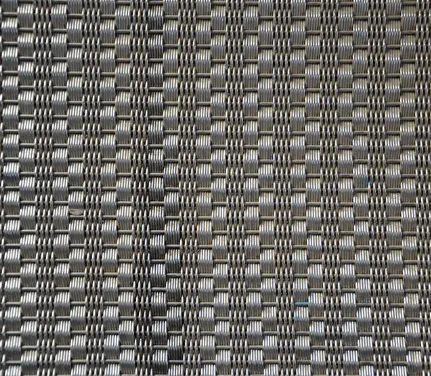Apr . 18, 2025 09:14 Torna alla lista
The Importance of Decorative Mesh in Multiple Fields
Decorative mesh, As a material with functionality and aesthetics, it plays an increasingly important role in today's society. It is widely used in various fields such as architecture, interior design, industrial manufacturing, and artistic creation due to its unique design, diverse materials, and excellent performance, bringing innovation and improvement to these fields.

In the field of architecture, decorative mesh is not only a decorative material, but also a functional element
It can be used as a cladding for building facades, creating unique visual effects and enhancing the aesthetic value of the building through different hole sizes, materials, and colors. At the same time, Deco mesh can also play a role in shading, ventilation, and protecting building structures. For example, in high-rise buildings, decorative mesh can effectively reduce solar radiation, lower indoor temperature, thereby reducing air conditioning energy consumption and achieving energy conservation and environmental protection. In addition, decorative mesh can prevent birds and other organisms from damaging buildings, extending their service life.
In the field of interior design, the application of decorative mesh is more flexible and versatile
It can be used as a partition, screen, ceiling, etc., creating different spatial atmospheres. By utilizing the transparency and translucency of Deco mesh, designers can create semi open spaces that ensure privacy while maintaining spatial coherence. In addition, decorative mesh can also be combined with other materials such as glass, wood, stone, etc. to create more diverse design effects. In commercial spaces, decorative mesh is often used to create brand image and enhance brand recognition.
In the field of industrial manufacturing, the application of decorative mesh is also very extensive
It can be used as a filter, protective net, conveyor belt, etc., applied in industries such as food processing, chemical, pharmaceutical, etc. In these industries, the material of decorative mesh needs to have characteristics such as corrosion resistance, high temperature resistance, and easy cleaning to ensure the safety and hygiene of the production process. In addition, decorative mesh can also be used to manufacture automotive components, electronic devices, etc., enhancing product performance and aesthetics.
Decorative mesh also demonstrates its unique charm in artistic creation
Artists utilize the extensibility, plasticity, and light and shadow effects of decorative mesh netting to create various sculptures, installation artworks, and creative home items. These works not only have aesthetic value, but also convey the artist's thoughts and emotions.
In summary, decorative mesh netting plays an important role in various fields such as architecture, interior design, industrial manufacturing, and artistic creation due to its functionality and aesthetics. With the continuous development of technology and the increasing demand for quality of life, the application prospects of decorative mesh will be even broader, and it will continue to bring innovation and progress to social development.
Decorative Mesh FAQs
What is decorative metal mesh?
Decorative metal mesh is a mesh material woven or welded from metal wires (such as stainless steel, copper, aluminum, etc.), which has a beautiful appearance and diverse designs. It is widely used in fields such as architecture, interior design, and art installations, combining functionality and decoration.
What are the main characteristics of decorative metal mesh?
Aesthetics: Diverse weaving patterns and designs can meet different aesthetic needs.
Durability: The metal material gives it a long service life and good corrosion resistance.
Transparency and ventilation: The mesh structure allows light and air to pass through, making it suitable for use in curtain walls, screens, etc.
Customizability: Different materials, colors, patterns, and sizes can be customized according to needs.
Easy to install and maintain: lightweight, easy to install, and easy to clean.
What are the main application areas of decorative metal mesh?
Architectural curtain wall: used for exterior wall decoration of buildings, combining aesthetics and functionality.
Interior decoration: used for ceilings, walls, screens, partitions, etc.
Landscape design: used for sculptures, fences, and decorative structures in parks and squares.
Furniture design: Decorative elements used for furniture such as tables, chairs, and cabinet doors.
Art installation: used for creative design in exhibitions and public art projects.
What are the common materials for decorative metal mesh?
Stainless steel: corrosion-resistant, high strength, suitable for indoor and outdoor use.
Copper: It has a unique color and texture, suitable for high-end decoration.
Aluminum: Lightweight, easy to process, suitable for large-scale use.
Galvanized steel: economical and practical, suitable for projects with limited budgets.
How to choose a suitable decorative metal mesh?
When making a choice, the following factors should be considered:
Design style: Choose appropriate patterns and materials based on the overall design style.
Usage environment: Corrosion resistance and durability should be considered for indoor and outdoor use.
Transparency and ventilation: Choose the mesh size and weaving method according to your needs.
Budget: The prices of different materials and processes vary greatly, so it is necessary to choose according to the budget.
Installation method: Consider the convenience of installation and structural support requirements.
condividere
-
What Factors Influence Gabion Mesh Price and Sizing?
NotiziaJun.23,2025
-
What Factors Impact the Selection and Cost of Gabion Products?
NotiziaJun.23,2025
-
What Are the Key Uses and Considerations for Gabion Products?
NotiziaJun.23,2025
-
What Are the Key Applications and Benefits of Welded Mesh Gabion Baskets and Related Solutions?
NotiziaJun.23,2025
-
What Are the Key Applications and Benefits of Gabion Solutions?
NotiziaJun.23,2025
-
What Are the Key Applications and Advantages of Welded Wire Gabion Baskets and Related Solutions?
NotiziaJun.23,2025

